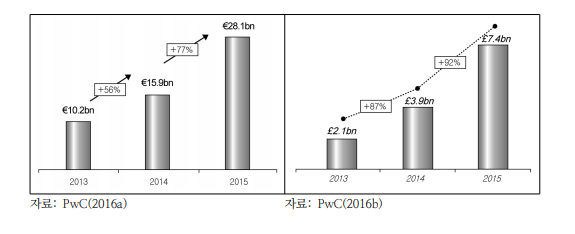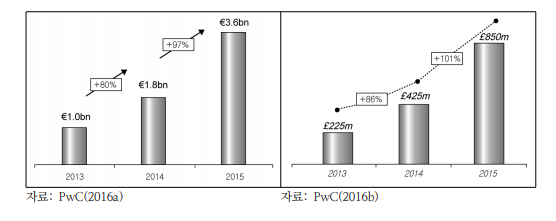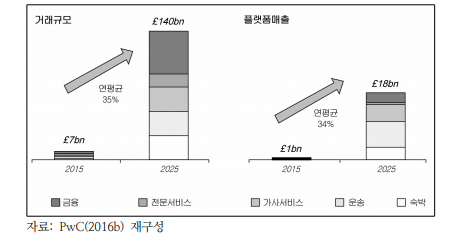List
Story > NEWS > Detail
[Resources] Shared Economy in England
The shared economy is rapidly spreading throughout the world as the development of ICT has enabled matching between suppliers and demanders through online platforms. As a result, expectations are growing that the shared economy will create new business opportunities through innovative business models, thereby boosting overall economic growth. Europe, where the shared economy has not been activated compared to the U.S. and China, is also paying attention to the potential of a shared economy to the extent that the European Commission studies the market size and development trend of the shared economy and issues guidelines to encourage a shared economy.

<Left: Trend in the Scale of Shared Economy in Europe, Right: Trends in the Scale of Shared Economy in England>
According to the European Commission, awareness and utilization of the shared economy has shown that 52 percent of EU citizens know of shared economic services, 17 percent are not low enough to have been used at least once, and the size of the shared economy is small but growing fast in recent years. In particular, Britain's shared economy has grown at a rapid pace to form the largest scale in Europe, making it the European shared economic hub.
According to PwC (2016b), the UK's shared economy accounts for about one-third of Europe's shared economy in 2015 and is the fastest growing in Europe. Based on five areas, including transportation and accommodation between individuals, finance, household services and professional services, the size of Europe's shared economic transactions and commission-based platform sales in 2015 amounted to 28.1 billion euros and 3.6 billion euros, respectively, which grew 77 percent and 97 percent on-year. In that area, in 2015, the UK is estimated to have a 92% and 101% increase in transaction size and platform sales, respectively, above European growth, to 7.4 billion pounds and 850 million pounds. By sector, Britain's shared economy grew in three areas, led by transportation, accommodation and finance, the In 2015, the portion of finance and accommodation in Britain's shared economy trading volume stood at 40 percent and 37 percent, respectively, with the two sectors accounting for about 80 percent. On the other hand, in terms of platform sales, transport and accommodation account for 38% and 27%, respectively, with the two sectors accounting for about 68% of the total UK shared economy (PwC, 2016b).

<Left: Trends in sales of shared economic platforms in Europe, Right: Trends in sales of shared economic platforms in the UK>
In the future, the achievements of the shared economy in the U.K. are expected to continue to record high growth of over 30 percent annually from 2015 to 2025. UK transactions of shared economies are expected to grow at an annual average rate of about 35 percent from 2015 to reach about 140 billion pounds by 2025. In addition, UK sales of shared economic platforms are expected to grow about 34 percent annually over a decade from 2015 to reach 18 billion pounds by 2025. By 2025, financial and transportation are still the largest in terms of transaction volume and platform sales, respectively, but the pace of growth is expected to be the fastest. Between 2015 and 2025, sales of platforms in the shared economy and finance sector and transportation sector are expected to grow at an annual average rate of more than 30 percent, respectively, but sales of domestic service platforms are expected to expand at an annual average rate of about 45 percent

<The Prospect of a Shared Economy in the U.K.>
One of the major factors that has led Britain to emerge as the hub of Europe's shared economy is the shared economy-friendly policy and regulatory environment. The British government is also positive in drawing up a system that emphasizes the importance of a shared economy and promotes the use of a shared economy, including some examples. The Digital Economy Minister said that the priority would be to promote a shared economy, while the Home Affairs Minister said Britain aims to become a global center for shared economies. The Community Minister issued guidelines to the local councils to make parking-sharing services, such as Justpark, available in areas where parking difficulties are severe. In addition, in March 2015 BIS, Department for Business, Innovation and Skills published a positive review of the UK's privately prepared recommendations to become a global shared economic hub at the request of the UK government in September 2014. According to the report, the U.K. government already said it is applying different regulations on providing accommodation sharing services to commercial accommodations and their residences in the case of accommodation sharing in the case of accommodation in the case of accommodation sharing, which is a representative area of shared economy, and stated that the accommodation sharing service provider can also be exempted from income tax for up to £4,250 in the case of the Rent-a-Room Scheme system Meanwhile, the court's favorable ruling was made on the car-call service leading the shared economy along with the lodging-sharing service. In a lawsuit filed by the Transport for London against the LTDA (The Licensed Taxi Drivers' Association) for the ongoing claim of Uber app illegality, the High Court decided that Uber apps were not illegal. As a result, Uber services became law in London.
In this era of global low growth, interest in the growth potential of the shared economy is soaring worldwide. The U.K. has early paid attention to the innovation and potential of the shared economy and created an environment friendly to the shared economy. This policy environment has contributed to the UK's formation of the largest market for shared economies in Europe based on the infrastructure needed to revitalize the shared economy, such as high ICT utilization rates and entrepreneurship. This is expected to be a big boost not only for Britain to lead Europe's shared economy, but for further achievement of its goal of becoming a global shared economy.

<JustPark>
With the slow growth of the manufacturing sector, which has also led the domestic economy, interest in the potential of a shared economy that revolutionizes the service industry as a new growth engine is rising. However, the growth of the shared economy is slow due to insufficient conditions including the legal system of interest. However, since South Korea also has a high level of ICT infrastructure and ability to utilize it, it has sufficient potential for growth of a shared economy. Therefore, realizing the growth potential of a shared economy requires efforts by both market participants, including the government, to create an environment where a shared economy can be activated, such as improving the legal system for existing and shared economy companies to grow together, establishing a start-up ecosystem where startups that present innovative shared economy business models can succeed in the market, as well as creating a consumer protection system and a trust system that can be safely accessed from personal information breaches, hygiene, crime and crimes.
The shared economy is rapidly spreading throughout the world as the development of ICT has enabled matching between suppliers and demanders through online platforms. As a result, expectations are growing that the shared economy will create new business opportunities through innovative business models, thereby boosting overall economic growth. Europe, where the shared economy has not been activated compared to the U.S. and China, is also paying attention to the potential of a shared economy to the extent that the European Commission studies the market size and development trend of the shared economy and issues guidelines to encourage a shared economy.

<Left: Trend in the Scale of Shared Economy in Europe, Right: Trends in the Scale of Shared Economy in England>
According to the European Commission, awareness and utilization of the shared economy has shown that 52 percent of EU citizens know of shared economic services, 17 percent are not low enough to have been used at least once, and the size of the shared economy is small but growing fast in recent years. In particular, Britain's shared economy has grown at a rapid pace to form the largest scale in Europe, making it the European shared economic hub.
According to PwC (2016b), the UK's shared economy accounts for about one-third of Europe's shared economy in 2015 and is the fastest growing in Europe. Based on five areas, including transportation and accommodation between individuals, finance, household services and professional services, the size of Europe's shared economic transactions and commission-based platform sales in 2015 amounted to 28.1 billion euros and 3.6 billion euros, respectively, which grew 77 percent and 97 percent on-year. In that area, in 2015, the UK is estimated to have a 92% and 101% increase in transaction size and platform sales, respectively, above European growth, to 7.4 billion pounds and 850 million pounds. By sector, Britain's shared economy grew in three areas, led by transportation, accommodation and finance, the In 2015, the portion of finance and accommodation in Britain's shared economy trading volume stood at 40 percent and 37 percent, respectively, with the two sectors accounting for about 80 percent. On the other hand, in terms of platform sales, transport and accommodation account for 38% and 27%, respectively, with the two sectors accounting for about 68% of the total UK shared economy (PwC, 2016b).

<Left: Trends in sales of shared economic platforms in Europe, Right: Trends in sales of shared economic platforms in the UK>
In the future, the achievements of the shared economy in the U.K. are expected to continue to record high growth of over 30 percent annually from 2015 to 2025. UK transactions of shared economies are expected to grow at an annual average rate of about 35 percent from 2015 to reach about 140 billion pounds by 2025. In addition, UK sales of shared economic platforms are expected to grow about 34 percent annually over a decade from 2015 to reach 18 billion pounds by 2025. By 2025, financial and transportation are still the largest in terms of transaction volume and platform sales, respectively, but the pace of growth is expected to be the fastest. Between 2015 and 2025, sales of platforms in the shared economy and finance sector and transportation sector are expected to grow at an annual average rate of more than 30 percent, respectively, but sales of domestic service platforms are expected to expand at an annual average rate of about 45 percent

<The Prospect of a Shared Economy in the U.K.>
One of the major factors that has led Britain to emerge as the hub of Europe's shared economy is the shared economy-friendly policy and regulatory environment. The British government is also positive in drawing up a system that emphasizes the importance of a shared economy and promotes the use of a shared economy, including some examples. The Digital Economy Minister said that the priority would be to promote a shared economy, while the Home Affairs Minister said Britain aims to become a global center for shared economies. The Community Minister issued guidelines to the local councils to make parking-sharing services, such as Justpark, available in areas where parking difficulties are severe. In addition, in March 2015 BIS, Department for Business, Innovation and Skills published a positive review of the UK's privately prepared recommendations to become a global shared economic hub at the request of the UK government in September 2014. According to the report, the U.K. government already said it is applying different regulations on providing accommodation sharing services to commercial accommodations and their residences in the case of accommodation sharing in the case of accommodation in the case of accommodation sharing, which is a representative area of shared economy, and stated that the accommodation sharing service provider can also be exempted from income tax for up to £4,250 in the case of the Rent-a-Room Scheme system Meanwhile, the court's favorable ruling was made on the car-call service leading the shared economy along with the lodging-sharing service. In a lawsuit filed by the Transport for London against the LTDA (The Licensed Taxi Drivers' Association) for the ongoing claim of Uber app illegality, the High Court decided that Uber apps were not illegal. As a result, Uber services became law in London.
In this era of global low growth, interest in the growth potential of the shared economy is soaring worldwide. The U.K. has early paid attention to the innovation and potential of the shared economy and created an environment friendly to the shared economy. This policy environment has contributed to the UK's formation of the largest market for shared economies in Europe based on the infrastructure needed to revitalize the shared economy, such as high ICT utilization rates and entrepreneurship. This is expected to be a big boost not only for Britain to lead Europe's shared economy, but for further achievement of its goal of becoming a global shared economy.

<JustPark>
With the slow growth of the manufacturing sector, which has also led the domestic economy, interest in the potential of a shared economy that revolutionizes the service industry as a new growth engine is rising. However, the growth of the shared economy is slow due to insufficient conditions including the legal system of interest. However, since South Korea also has a high level of ICT infrastructure and ability to utilize it, it has sufficient potential for growth of a shared economy. Therefore, realizing the growth potential of a shared economy requires efforts by both market participants, including the government, to create an environment where a shared economy can be activated, such as improving the legal system for existing and shared economy companies to grow together, establishing a start-up ecosystem where startups that present innovative shared economy business models can succeed in the market, as well as creating a consumer protection system and a trust system that can be safely accessed from personal information breaches, hygiene, crime and crimes.



